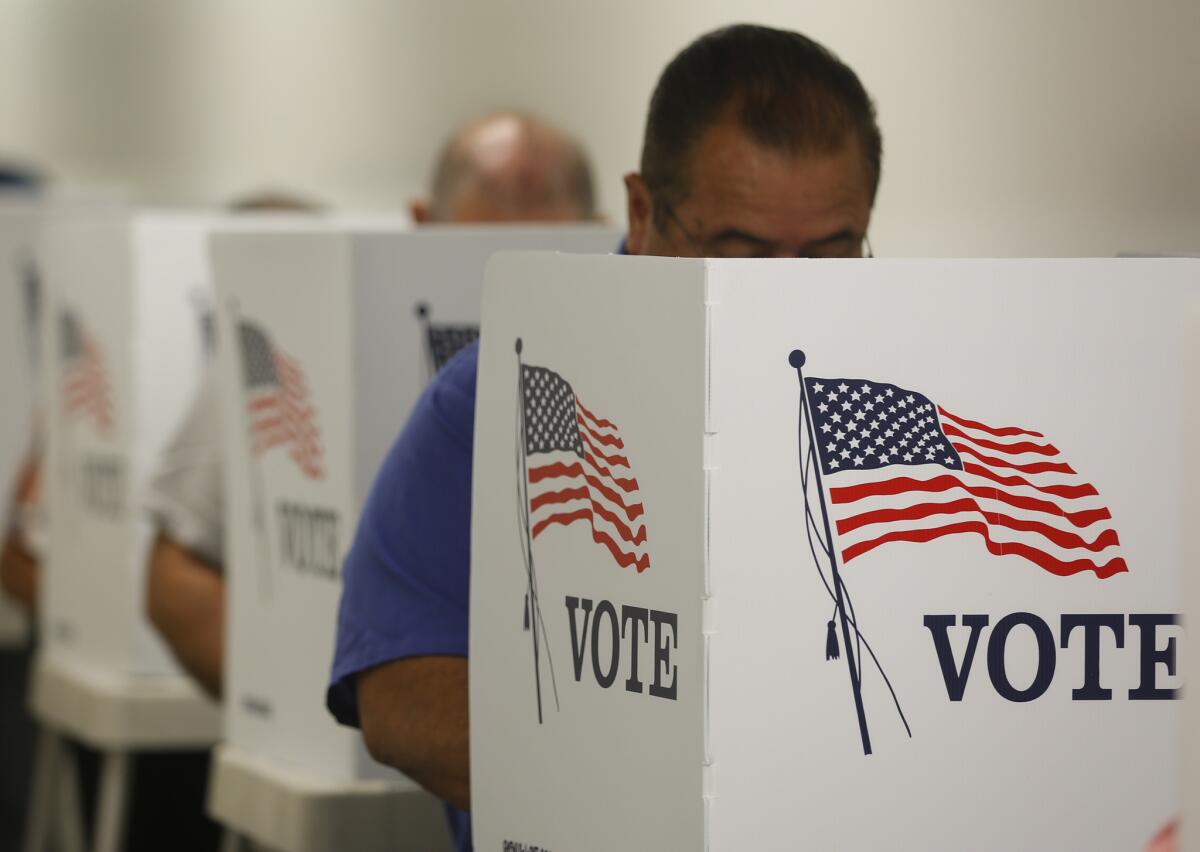Capitol Journal: Bored by state races, young Californians increasingly forsake their right to vote

- Share via
Reporting from Sacramento — As we celebrate America’s 241st birthday, it’s sad that increasing numbers of us aren’t bothering to vote. Especially in California.
Voting arguably is our most valued right and first duty as citizens.
But don’t fret. This isn’t going to be a long, finger-wagging lecture. If someone thinks voting is a drag or meaningless, that’s fine. Go play with your iPhone. I’ll vote for you. The more who don’t vote, the more potent my ballot becomes.
Just don’t gripe about politicians when you pass up an opportunity to give them the boot.
This came to mind when I picked up a new report titled “California’s Missing Voters: Who Is Not Voting and Why.” It was prepared by the nonpartisan Public Policy Institute of California.
In California, it reported, there’s a long decline in voter registration compared with other states. And there’s declining voter turnout in non-presidential elections.
Why? The fastest growing ethnic groups, Latinos and Asian Americans, are registering to vote at lower rates than whites and blacks.
“The registration problem is especially pronounced among Latinos and Asian Americans more closely connected to the immigrant experience,” the report reads. Those are people who are naturalized citizens or children born to noncitizen immigrant parents.
As for fewer voters showing up in midterm elections, that’s because young people aren’t as interested in statewide offices as they are in the White House. It shouldn’t have taken much research to figure that out.
But this is intriguing: Young people are voting in midterms at “much lower rates” than two decades ago.
“Presidential elections are cultural touchstones that attract far more attention than midterms,” the report says, “so a gap between turnout in presidential elections and … midterms is historically normal. But the gap in California has been growing.”
For what reason? The report’s author, former University of Oregon political science professor Eric McGhee, says he doesn’t know.
Here’s my guess: Young people find California’s gubernatorial races increasingly boring. Certainly Gov. Jerry Brown’s reelection jog against a token Republican candidate in 2014 was a yawner.
Some basic numbers, dug out by Paul Mitchell, who heads Political Data Inc.: Of California’s 19.5 million registered voters, nearly 25% are Latino and 9.4% are Asian. Roughly 61% are white. So California voters still are disproportionately white, even though Latinos now slightly outnumber whites in total population.
The latest U.S. census breakdown for California: Latinos 38.8%, whites 37.8%, Asians 14%, blacks 5.6%.
Latino voting strength isn’t what it should be, Mitchell says, because they’re younger. And young people tend to kiss off elections. Even among Latinos who are registered, he says, 27% are millennials. Only 14% of whites are.
Here’s a sorry fact: In the last gubernatorial general election, only 30.9% of California’s voter-eligible population cast ballots. When Brown was elected governor for the first time in 1974, 46.5% of the eligible population voted. There were fewer Latinos then.
I called Secretary of State Alex Padilla, whose parents were Mexican immigrants, and asked why Latinos vote in smaller percentages than whites and blacks.
“If you’re raised in a household where your parents are regular voters, chances are huge that you’ll grow up to be a voter,” Padilla told me.
“When I was growing up [in Pacoima], my parents never talked about who they were going to vote for. They immigrated legally in the 1960s and didn’t apply for citizenship until the 1990s — until after Proposition 187.”
That nasty initiative motivated many Latinos. The 1994 measure sought to eliminate public services, including schooling, for immigrants here illegally. Voters passed 187 overwhelmingly, but it was thrown out by the courts. It propelled many Latinos into politics, including Padilla.
“I got out of college and 187 was on the ballot,” Padilla recalled. “I realized I had to get involved. Five years later I was running for [Los Angeles] City Council.” He won and later was elected to the Legislature.
Proposition 187 turned many Latinos forever against the GOP because Republican Gov. Pete Wilson was its chief advocate.
Another reason Latinos often don’t vote, Padilla said, is because many are poor. “It’s a matter of priorities,” the Democrat said. “When you’re trying to put a roof over your head and food on the table, you’re not tuning into the political debate.”
Padilla and other politicians — mainly Democrats — are trying to make voting easier.
Starting next year, citizens will be automatically registered to vote when they obtain or renew their driver’s license. Kids can currently pre-register at age 16 so they can vote the minute they turn 18. You can now register on election day. Next year, some counties will mail ballots to everyone who’s registered. All counties will be allowed to do that in 2020.
The demographic shift has hurt the Republican Party in California. State party Chairman Jim Brulte reminds Republican groups that the decline in the GOP’s share of registration — down to just under 26% — parallels the decline in the white portion of the population.
“The trends may eliminate our ability to be competitive in many of the legislative and congressional districts unless we can significantly increase our registration numbers among millennials, Hispanics and Asians,” he warns.
One thing to keep in perspective during this national birthday party: The only people allowed to vote after that original July 4th were white, male property owners. We’ve come far, even if too many Americans shrug off it off.
Follow @LATimesSkelton on Twitter
ALSO
How far left can California’s legislative Democrats go before Republicans benefit at the ballot box?
More to Read
Get the L.A. Times Politics newsletter
Deeply reported insights into legislation, politics and policy from Sacramento, Washington and beyond. In your inbox twice per week.
You may occasionally receive promotional content from the Los Angeles Times.











